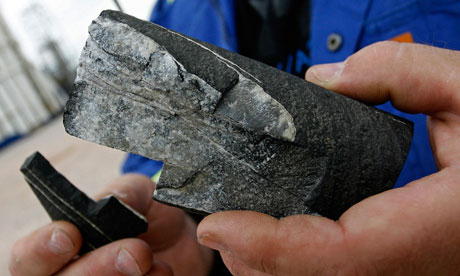 |
| Photo source: http://www.princes-foundation.org/about-us/partners-affiliates |
I spent three days this week away from Ulverston ( June average climate stats: 17°C day time high, 56 mm precipitation, 18 km/h wind speed) in sunny Cambridge ( 20°C day time avg high, 52 mm avg precipitation, 15 km/h avg wind speed ) on the Prince's Teaching Institute geography summer school. This is the tenth year the institute has been running and I'm grateful to my school for sending me on what has been an enriching and very worthwhile course. The following is just a very brief summary of the variety of lectures, networking and discussions that took place. Hopefully it will encourage others to get involved!
50 shades of grey - fracking in the USA and UK from Prof Ian Stewart.
 |
| Shale rock. Photo source: Guardian.co.uk |
Ian's lecture followed a similar approach to the programme but with a greater analysis of the UK's shale gas potential and current energy mix, as well as more detail on the fracking process itself. Ian also reviewed a number of health and environmental impacts linked to fracking that have been shaking communities to the core: high methane content in tap water; fracking's connections with earthquakes; and the contamination of ground water from chemicals associated with the drilling process. It's not just those with environmental concerns who are concerned with fracking: 90% of Russia's gas exports are to Europe, a significant commitment for a country rich in natural resources. The USA on the other hand has seen a reduction in their country wide CO2 emissions due to a greater reliance on shale gas and expanding exports of coal abroad ( more embedded CO2 in coal). A point picked up in President Obama's recent announcement on bringing down America's emissions.
I did feel Ian's presentation lacked a deeper discussion on the potential impact of fracking on global warming and frackings potential to direct investment and development from renewable technology. This is particularly relevant for the UK at a time when the independent Committee on Climate Change has just reported that the UK is in danger of missing its CO2 reduction targets for 2020. However, he clearly communicated the issue in an engaging way; a key skill for scientist surely?
Christian Nold - mapping emotional change
 |
| Preparing to emotional map in the field. Source: Alasdair Monteith |
In the field...... Geographers let loose in Cambourne.
The opportunity to get out and about with fellow geographers adds weight to the need for geography to have a strong fieldwork element. You can't experience the size of a glaciated valley, see the impact of development or experience a deprived community solely through a picture or book ( no matter how much Planet Earth or Eastenders you watch).
National Curriculum focus
Summary
Unfortunately, what we really needed in the plenary session on Wednesday was the Minister of Education to be on the podium listening and answering questions.
More information about the Prince's Teaching Institute here

No comments:
Post a Comment